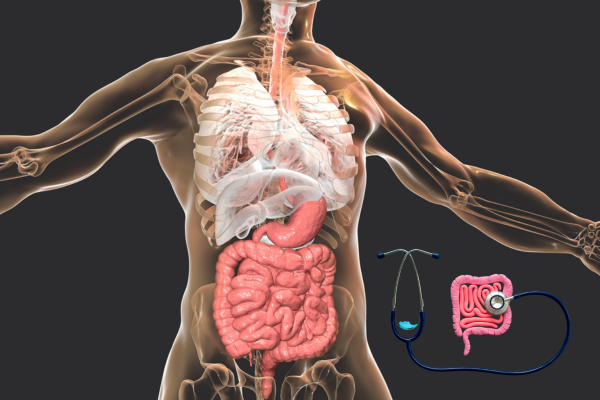Table of Contents
The relationship between gut health and weight loss is gaining attention. While many focus on diet and exercise, gut health plays a critical role in weight management. The gut microbiome, consisting of trillions of microorganisms, impacts how your body digests food, stores fat, and regulates hunger hormones. This article delves into the importance of gut health, exploring how probiotics, prebiotics, and a balanced diet can lead to effective weight management. As we explore this connection, we’ll uncover strategies for improving gut health to support your weight loss goals.
The Gut Microbiome: Your Body’s Weight Management Partner
The gut microbiome is a complex community of bacteria, fungi, and other microorganisms living in your digestive tract. These microbes play a crucial role in breaking down food, absorbing nutrients, and even producing vitamins. But their role doesn’t end there; they are also involved in weight management.
- Digestive Efficiency: A healthy gut microbiome enhances digestive efficiency, allowing your body to absorb nutrients more effectively and burn calories more efficiently.
- Hormone Regulation: Gut bacteria influence the production of hormones like ghrelin and leptin, which regulate hunger and satiety.
- Inflammation Control: An imbalance in gut bacteria can lead to inflammation, which is linked to obesity and other metabolic disorders.
Improving your gut health can help optimize these processes, making it easier to manage your weight. By nurturing your gut microbiome, you’re not only improving digestion but also setting the stage for better weight control.
The Role of Probiotics in Weight Loss
Probiotics are live bacteria that confer health benefits when consumed in adequate amounts. They are found in fermented foods like yogurt, kefir, sauerkraut, and in supplement form. These beneficial bacteria can positively impact gut health, leading to improved weight management.
- Enhanced Digestion: Probiotics help break down food more efficiently, aiding in nutrient absorption and reducing bloating.
- Fat Storage Reduction: Certain strains of probiotics have been shown to reduce fat storage by altering the way your body metabolizes food.
- Appetite Control: Probiotics can influence the production of appetite-regulating hormones, helping you feel full longer.
Incorporating probiotics into your diet can be a simple yet effective way to support your weight loss efforts. Regular consumption of probiotic-rich foods or supplements can lead to noticeable improvements in your gut health and weight management.
Prebiotics: The Unsung Heroes of Gut Health
Prebiotics are non-digestible fibers that feed the beneficial bacteria in your gut. Unlike probiotics, which are live bacteria, prebiotics serve as food for these bacteria, helping them thrive and multiply. This, in turn, supports a healthy gut microbiome, which is essential for effective weight management.
- Gut Bacteria Nourishment: Prebiotics provide the fuel needed for beneficial bacteria to grow, leading to a more balanced gut microbiome.
- Improved Metabolism: A thriving gut microbiome can boost your metabolism, helping your body burn calories more efficiently.
- Reduced Inflammation: Prebiotics can help reduce inflammation in the gut, which is often linked to weight gain and metabolic issues.
Foods rich in prebiotics include onions, garlic, bananas, and asparagus. By including these foods in your diet, you can enhance the effectiveness of probiotics and further support your weight loss journey.
The Power of a Balanced Diet for Gut Health and Weight Loss
A balanced diet is crucial for maintaining a healthy gut and supporting weight loss. While probiotics and prebiotics play a vital role, the overall quality of your diet cannot be overlooked. A diet rich in whole foods, fiber, and healthy fats can significantly impact your gut health and weight management efforts.
- Whole Foods: Whole, unprocessed foods are packed with nutrients and fiber, which are essential for gut health.
- Fiber-Rich Foods: Dietary fiber acts as a prebiotic, feeding your gut bacteria and promoting a healthy digestive system.
- Healthy Fats: Fats from sources like avocados, nuts, and olive oil support gut health by reducing inflammation and promoting the growth of beneficial bacteria.
By focusing on a diet that includes a variety of nutrient-dense foods, you can create a supportive environment for your gut microbiome, making it easier to achieve and maintain a healthy weight.
The Impact of Gut Health on Metabolism and Weight Loss
Your gut health directly influences your metabolism, which plays a significant role in weight loss. A healthy gut can boost your metabolism, helping you burn more calories even at rest. Conversely, an unhealthy gut can slow down your metabolism, making it harder to lose weight.
- Calorie Utilization: A healthy gut microbiome helps your body utilize calories more effectively, converting food into energy rather than storing it as fat.
- Thermogenesis: Certain gut bacteria are involved in thermogenesis, the process by which your body burns calories to produce heat.
- Reduced Fat Absorption: A balanced gut microbiome can reduce the absorption of dietary fats, helping to prevent weight gain.
Improving your gut health can lead to a more efficient metabolism, making it easier to lose weight and keep it off. This underscores the importance of taking care of your gut when pursuing weight loss goals.
Stress, Gut Health and Weight Loss: The Triangular Relationship
Stress can negatively impact gut health, which in turn can affect your weight loss efforts. When you’re stressed, your body releases cortisol, a hormone that can disrupt the balance of bacteria in your gut. This imbalance can lead to digestive issues, increased fat storage, and difficulty in losing weight.
- Cortisol Impact: High cortisol levels can lead to an overgrowth of harmful bacteria in the gut, causing inflammation and weight gain.
- Stress Eating: Stress often leads to emotional eating, which can disrupt your gut microbiome and hinder weight loss.
- Gut-Brain Axis: The gut and brain are connected through the gut-brain axis, meaning stress can directly affect gut health and vice versa.
Managing stress is crucial for maintaining a healthy gut and supporting weight loss. Techniques such as mindfulness, meditation, and regular physical activity can help reduce stress and promote better gut health.
Lifestyle Changes to Support Gut Health and Weight Loss
In addition to diet, certain lifestyle changes can significantly impact your gut health and weight loss efforts. By adopting habits that support a healthy gut, you can create a more favorable environment for weight management.
- Regular Exercise: Physical activity promotes gut health by increasing the diversity of your gut bacteria and improving digestion.
- Adequate Sleep: Sleep is essential for gut health, as poor sleep can disrupt the balance of gut bacteria and lead to weight gain.
- Hydration: Staying hydrated supports digestion and helps maintain a healthy gut environment.
Incorporating these lifestyle changes can enhance your gut health, making it easier to achieve and maintain a healthy weight.
The Role of Hydration in Gut Health and Weight Loss
Hydration plays a key role in maintaining gut health and supporting weight loss. Water is essential for digestion, helping to break down food and transport nutrients throughout your body. Adequate hydration also supports a healthy gut microbiome, which is crucial for effective weight management.
- Digestion Support: Water helps in the breakdown of food, making it easier for your body to absorb nutrients.
- Bowel Regularity: Proper hydration prevents constipation, promoting regular bowel movements and a healthy gut.
- Metabolism Boost: Staying hydrated can boost your metabolism, helping you burn more calories throughout the day.
Ensuring you drink enough water daily is a simple yet effective way to support your gut health and weight loss efforts. Aim for at least eight glasses of water a day to keep your digestive system functioning optimally.
Conclusion: Achieving Weight Loss Through Gut Health
The connection between gut health and weight loss is clear. A healthy gut microbiome supports digestion, regulates hormones, and boosts metabolism, all of which are essential for effective weight management. By incorporating probiotics, prebiotics, and a balanced diet into your daily routine, along with making necessary lifestyle changes, you can improve your gut health and achieve your weight loss goals. Remember, taking care of your gut is not just about losing weight—it’s about enhancing your overall health and well-being.










